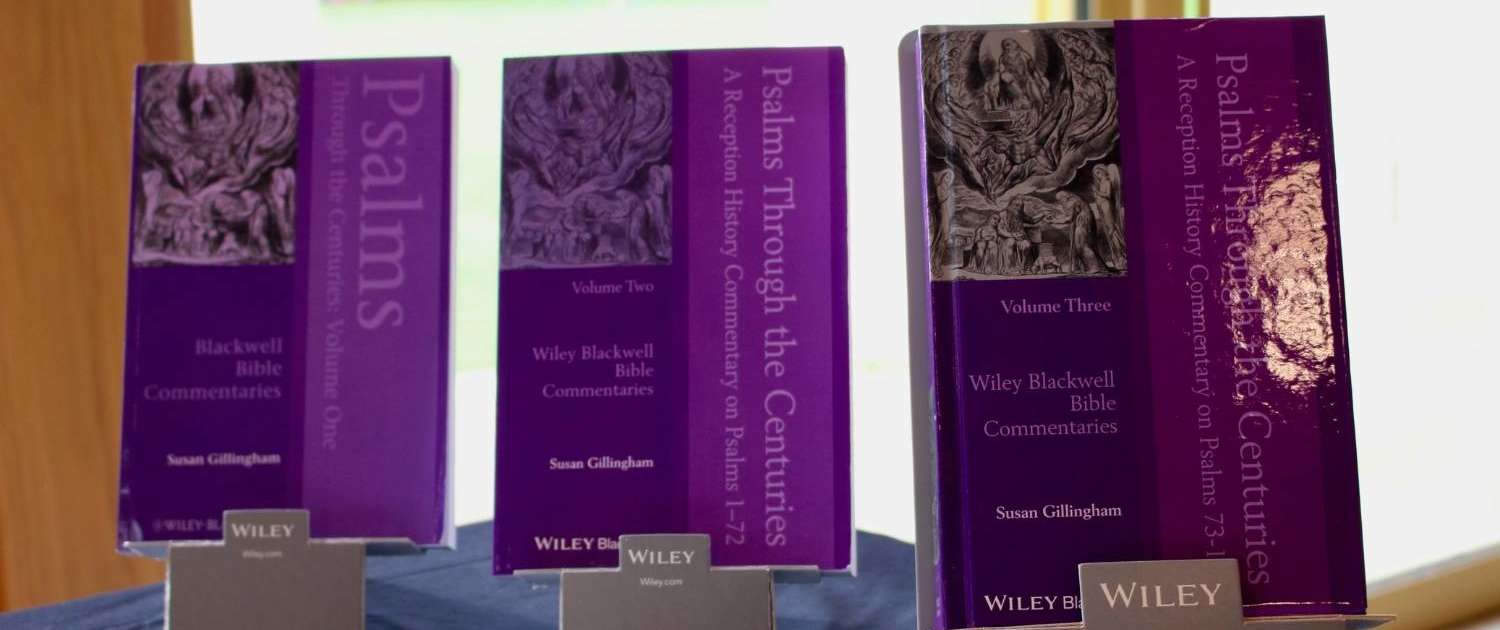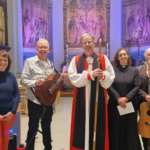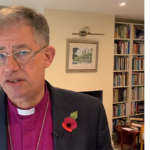Bishop Steven attended the launch event marking the publication of the final volume of a history commentary on the Psalms by the Revd Canon Professor Sue Gillingham. Read his full speech at Worcester College given on Saturday 22 October 2022.
It’s a real honour to be here this afternoon for the launch of this wonderful commentary and to follow Professor John Barton, who more than forty years ago first inspired my love of Old Testament studies in his lectures on the Exile when I was an undergraduate at Worcester.
Sue’s commentary is a treasure trove for preachers and ministers and anyone who wants to understand the psalms in the life of the church. This week I’ve been leading prayers each day in the House of Lords (much needed this week). There is very little choice or discretion in the prayers except the selection of the psalm for the day and even that is limited. Woe betide the bishop who doesn’t use Psalm 121 for the last sitting day of each week: I will lift up mine eyes to the hills.
I turned up Psalm 121 this morning in Sue’s wonderful commentary. I learned several things in the space of a few minutes. Psalm 121 isn’t quoted in the New Testament or very much by the Fathers. It’s used as a Sabbath prayer and by Christians at funerals. The hills have inspired poetry including by DH Lawrence and painting. Most delightfully, a snatch of Psalm 121 is sung by Maria in the Sound of Music as the Von Trapps hide in the convent.
The Church needs to read the psalms with understanding in every age but particularly in our own. Sue’s commentary will be a vital resource in that. Despite Sue’s scholarship, we read the Psalms less in our Sunday worship than for many generations. Sue’s commentaries are rich and accessible, offering a range of different perspectives for every psalm, an enormous achievement.
Why do we need to read the psalms with understanding? Let me offer four brief reasons with Psalms to illustrate. First the Psalms help us to reflect on the nature of power and kingship and leadership. From Psalm 89: “I have made a covenant with my chosen one, I have sworn an oath to David my servant”.
The Psalms are a rich resource for reflecting on monarchy, on corporate personality, on the way the reflection on the king in the psalms, God’s anointed, flows into and enriches our understanding of the Christ. This is a coronation year with government in turmoil. What do the psalms teach us about power and personality, about the rise and fall of governments.
Second the Psalms help us reflect on creation. Psalm 104, one of my favourite psalms:
You spread out the heavens like a curtain and lay the beams of your dwelling places in the waters above; you make the clouds your chariot and ride on the wings of the wind.
It falls to our generation more than any other to keep the care and repair of creation in the forefront of the world’s attention. The Psalms point us all the time to the creation and the creator, to our responsibilities and role. Sue’s commentary points us to the poetry of George Herbert and the hymnody which flows from this Psalm and to the ecological readings from Fiji and from Kenya.
Third the church and the world are wrestling more deeply than for a generation with problems of suffering and pain and difficulty in the world. We need the minor keys of the psalms – the lament and questioning – more than ever to offer strength and succour. This volume of commentary begins with Psalm 73 which Sue calls a didactic psalm about the impious. Why do bad people prosper and good people suffer? The psalm draws us deeper into worship to find resources. Sue points us to the death bed hymn of Charles Wesley and the reflections of Martin Buber, always opening up new pathways of reflection on the ancient text.
Fourth and finally the psalms enrich our vocabulary and reflection on what it means to be human: what will be the great question of the age for the Church and for our whole society as we balance the limitations of the Earth and the new insights of science and technology.
Psalm 139 explores those depths perhaps more than any other Psalm: O Lord you have searched me out and known me, You know my sitting down and rising up. You discern my thoughts from afar.
The Psalm explores the wonder and mystery of humanity and has been a springboard for that reflection down all the ages. Sue’s commentary again points us to the Christological and Trinitarian readings of Psalm 139 which are so important in the tradition of interpretation. Sue explores the golem, the unique word for the prehuman condition in Rabbinic Judaism (though I looked in vain for a speculative reference to Tolkein). Sue takes us into contemporary debates around abortion and LGBTQ+ theologies which draw on Psalm 139.
Psalms through Centuries is a deep well and a treasure chest. Huge amounts of material have been brought together which will enrich the church, I hope for generations to come. Sue thank you so much for this immense labour and fruit of a lifetime’s scholarship.



